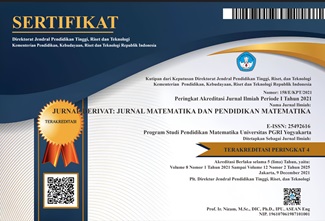Kemampuan Calon Pendidik Dalam Memanfaatkan Teknologi Komputer Untuk Mengembangkan Multimedia Pembelajaran Matematika
DOI:
https://doi.org/10.31316/j.derivat.v3i2.717Abstract
This study was aimed to describe ability of prospective student educators in using computer technology to develop mathematics learning multimedia. The ability was used to develop Power Point multimedia and Adobe Flash multimedia. This study was descriptive research with 27 prospective student educators as a subject. Researcher was main instrument assisted product evaluation rubric and questionnaire. The result showed that the average of ability of prospective student educators in using computer technology was in good category. The average score were 77,59Â in using Power Point multimedia and 74,54 in using Adobe Flash multimedia. The ability was sufficiently to be used in learning and teaching. From the product analyzed and questionnaire, we found that the ability were not maximal because there were many tools untapped primarily in Adobe Flash. Unfamiliar yet in used also became a factor that affected the ability of prospective educators in using computer technology.
Â
Keywords: The ability in using computer technology, mathematics learning multimedia, prospective educatorsDownloads
Published
Issue
Section
Citation Check
License
Authors who publish with this journal agree to the following terms:
-
Authors retain copyright and grant the journal right of first publication with the work simultaneously licensed under a Creative Commons Attribution-ShareAlike 4.0 International License that allows others to share the work with an acknowledgment of the work's authorship and initial publication in this journal.
- Authors are able to enter into separate, additional contractual arrangements for the non-exclusive distribution of the journal's published version of the work (e.g., post it to an institutional repository or publish it in a book), with an acknowledgment of its initial publication in this journal.
- Authors are permitted and encouraged to post their work online (e.g., in institutional repositories or on their website) prior to and during the submission process, as it can lead to productive exchanges, as well as earlier and greater citation of published work (See The Effect of Open Access).







